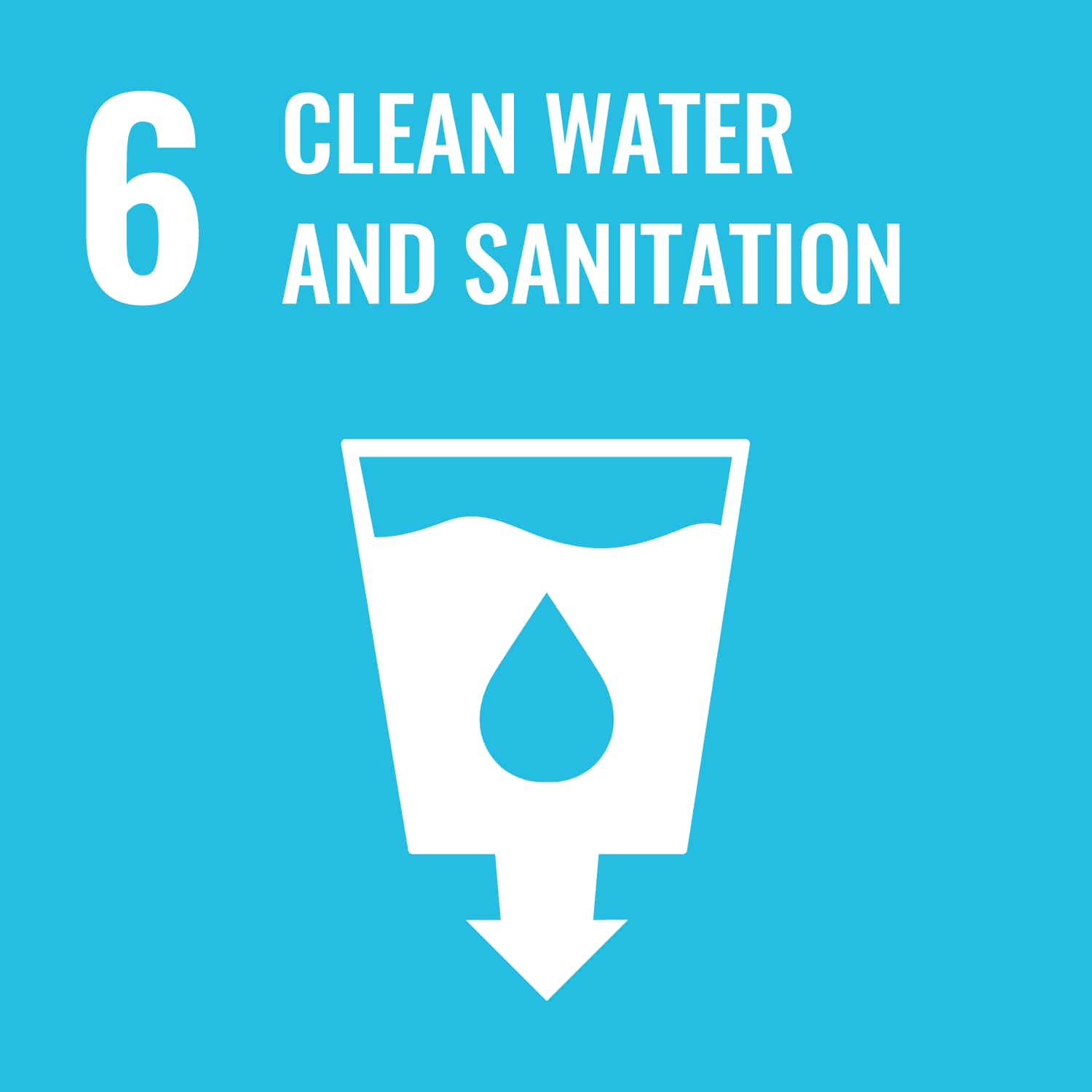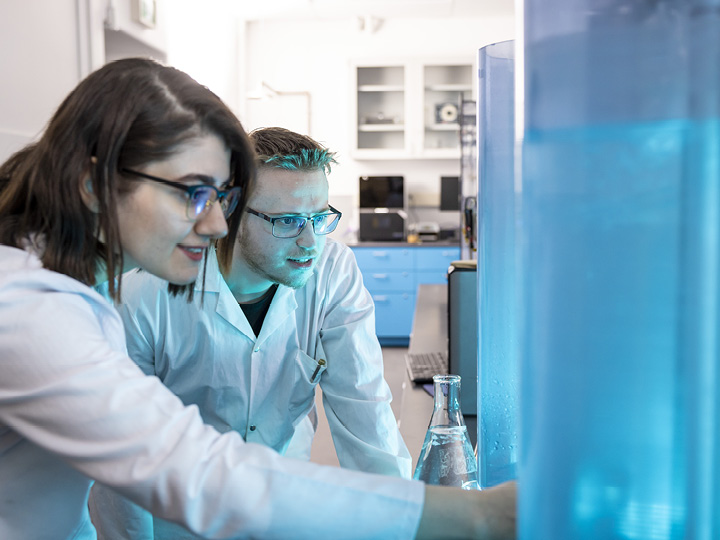SDG 6: Clean Water and Sanitation


SDG 6: Clean Water and Sanitation
TMU ranked 88th among universities around the world in the 2024 Times Higher Education Impact Rankings for its impact on clean water and sanitation. The university’s achievement in this area is largely attributed to the excellence of Urban Water TMU, a multidisciplinary consortium of researchers who are working together, and with students, to solve today’s complex clean water and sanitation challenges through dynamic research, strong external networks and collaborative action.
TMU ranked 88th in the world for impact on SDG 6: Clean Water and Sanitation (2024 Times Higher Education Impact Rankings ).
Urban Water TMU and Facilities Management have partnered with WWF-Canada to reduce the university’s use of road salt by one third (more than 6 tonnes) with a view to mitigating the impacts on water quality and aquatic ecosystem health.
Our goals in action

TMU aspires to develop pathways for all students to access sustainability learning and research opportunities that will prepare them to take action on the complex challenges facing our world today. To that end, our faculty members and researchers are currently teaching sustainability through hundreds of courses, programs and research initiatives, providing opportunities for students of any academic background to advance their sustainability knowledge and skills, with a particular focus on water.
- TMU has several graduate programs that are affiliated with the Urban Water TMU Research Centre, giving students a chance to learn about supporting the goal of clean water and sanitation in a variety of disciplines. Multidisciplinary course offerings in green infrastructure and the First Nations water crisis are also available to students across campus.
- Apathy to Empathy is an interdisciplinary curriculum-based project that was first piloted for several undergraduate courses in civil engineering, chemistry, geography and social sciences in the Fall 2021 semester. The project provides students and faculty with the opportunity to better understand multiple facets of the First Nations water crisis.
TMU is home to a number of research centres and institutes that are studying and innovating to solve a range of sustainability issues, including clean water and sanitation. Urban Water TMU is a leader in transdisciplinary solutions to complex urban water challenges. The centre prioritizes research and networks in: urban water management and governance; urban natural systems and green technologies; and freshwater science and governance.
TMU co-operates with various levels of government to support water security.
- At the local level, TMU is working with the City of Toronto (external link) to evaluate sewer blockage reports to the city to support better service delivery and public education, and Urban Water TMU led a session at the Canadian Water and Wastewater Conference on bringing academia, industry and government together.
- At the regional level, TMU’s Emerging Contaminants Lab is working with the Ontario Ministry of Environment (external link) to determine if plastic additives are entering the environment from wastewater effluent.
- Nationally, Urban Water TMU is building bridges with Indigenous communities and developing relationships (external link) in which traditional and western knowledge is shared and researchers collaborate with communities to undertake research and find solutions to community-identified needs.
- From a global perspective, Urban Water TMU is proud to be a partner of the International Water Decade Alliance (IWDA), which includes 20+ academic institutions, non-government organizations, associations and private sector interests seeking to develop solutions needed globally to achieve the SDGs that relate to water. Faculty members from TMU’s Faculty of Science are working with Canadian and Colombian partners to bring water security to rural Colombia.
TMU’s Sustainability Office is working towards advancing sustainability across our campus, and encourages active participation from the entire TMU community to reach our goals of building a more sustainable university and community. The office provides programming, education and outreach on ways to reduce waste, promote circularity and resource recovery, reduce energy and water consumption, increase awareness of the benefits of sustainable choices and more.
- TMU is committed to employing technologies and encouraging behaviours that minimize water waste. Our Sustainability Office tracks water consumption through the analysis of monthly utility bills and works to reduce water consumption through environmentally sustainable practices.
- The Sheldon and Tracy Levy Student Learning Centre (SLC) and the Daphne Cockwell Health Sciences Complex (DCC) use grey water collection systems that collect, treat, and use water from showers, taps and rain to flush toilets.
- Another important component of TMU’s Sustainability Action Plan is stormwater management, which is accomplished by designing water-efficient landscaping. By managing stormwater locally, TMU helps the City of Toronto (external link) with its management, which translates into significant environmental benefits. Vegetated landscaping and roofs help with stormwater management by reducing the runoff and absorbing most of it before it gets to the city sewers. TMU has installed vegetated roofs on the Centre for Urban Innovation (CUI), DCC, George Vari Engineering and Computing Centre (ENG) and SLC.
- TMU’s (google doc) Sustainable Buildings Guidelines (external link) apply to capital and deferred maintenance projects on campus. The Guidelines provide project-specific energy, GHG emissions and water efficiency targets in new construction and renovation projects; calculate energy and GHG project budgets; and introduce streamlined modeling, benchmark comparison, documentation submission, and approvals approach. See Section 9 of the Guidelines for information on water use specifications.

TMU is committed to providing interdisciplinary and experiential learning opportunities that bring students and faculty together to address real-world problems. This allows students to become more fully engaged with communities, service providers and industries as partners in their learning experiences. Urban Water TMU elevates the student experience through experiential learning, networking opportunities and mentorship, empowering them to gain real-world experience.
- Urban Water TMU’s UW Student Leadership Committee works closely on water-related projects and initiatives and helps support the UW strategic plan by working closely with Urban Water TMU staff and executive members.
- The UW Student Leadership Committee celebrated World Water Day 2023 by organizing two initiatives that shed light on the importance of water and the challenges it faces in today’'s world. The initiatives—a compilation of water stories from UW researchers and a groundwater documentary film screening—encouraged interactive dialogue between UW researchers and interested TMU students.
As a university located at the centre of Canada’s largest city, TMU has deep connections with our neighbours, with whom we share many of the same challenges and benefits of our urban location. We are committed to advancing conversations on culture, economics, technology, social justice and the environment that lead to policies and actions designed to contribute to building inclusive, resilient, sustainable and dynamic cities. Through knowledge sharing and collaborations with experts from other cities and institutions across Canada and around the world, we aim to find solutions to critical issues affecting water and the environment.
- TMU faculty and students have participated in sector dialogue and organized community events to provide educational opportunities on good water management. These include Urban Water TMU leading a session on bringing academia, industry and government together at the Canadian Water and Wastewater Conference; Faculty of Science professor Roxanna Suehring identifying water contaminants in fishing equipment; and faculty members from the Faculty of Science working with Canadian and Colombian partners on the Strengthening Coastal Aquifer Resilience and Groundwater Use Against Climate Change Effects in the Caribbean project, which aims to advance groundwater sustainability and freshwater quality in Colombia by disseminating knowledge on aquifers and salinity intrusion to Colombian communities, policymakers and students.
- Urban Water TMU has drafted a commitment (external link) to build relationships and work with Indigenous communities to improve access to safe drinking water for Indigenous people in Canada. Urban Water TMU will continue to build relationships with Indigenous community members to inform our research, education, activities and day-to-day operations. One dedicated framework for relationship development is the Apathy to Empathy Steering Committee, co-led by Elder Joanne Okimawininew Dallaire, which comprises Indigenous leaders and allies of Indigenous communities.
- Urban Water TMU graduate students participated in Ocean Wise’s Building Bridges- Tackling the Environmental and Social Challenges of Our Time event, highlighting the centre’s research on how multidisciplinary perspectives support applied research on plastics, emerging substances of concern and salt management. Also in attendance were members of the OceanBridge youth-service learning program for 19 to 30 year-olds to learn, network and become involved with ocean and freshwater research.

Stories
